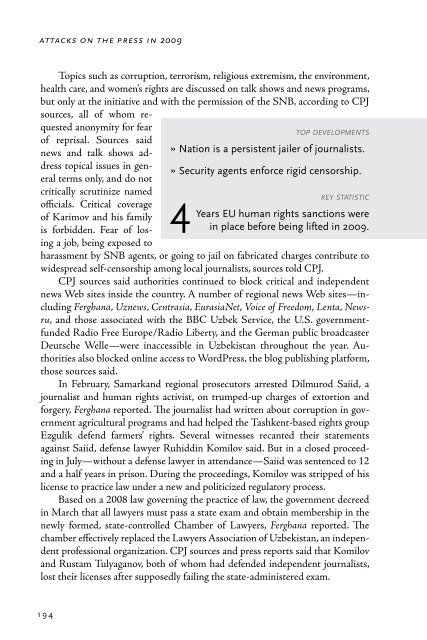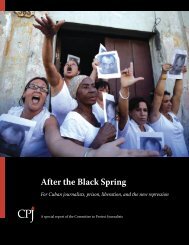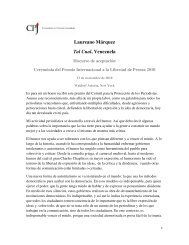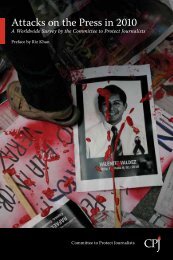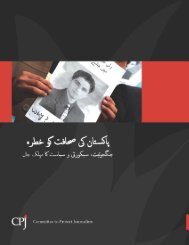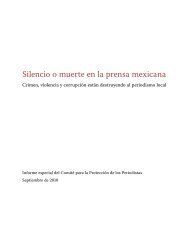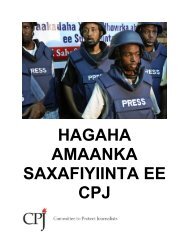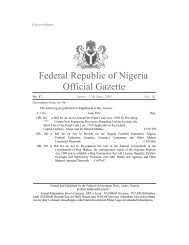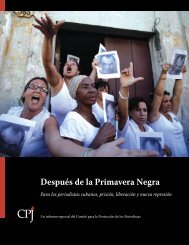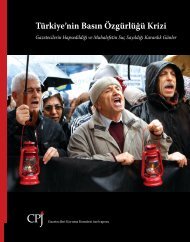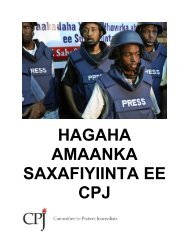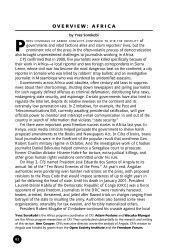Attacks on the Press - Committee to Protect Journalists
Attacks on the Press - Committee to Protect Journalists
Attacks on the Press - Committee to Protect Journalists
- No tags were found...
Create successful ePaper yourself
Turn your PDF publications into a flip-book with our unique Google optimized e-Paper software.
attacks <strong>on</strong> <strong>the</strong> press in 2009europe and central asia: uzbekistanTopics such as corrupti<strong>on</strong>, terrorism, religious extremism, <strong>the</strong> envir<strong>on</strong>ment,health care, and women’s rights are discussed <strong>on</strong> talk shows and news programs,but <strong>on</strong>ly at <strong>the</strong> initiative and with <strong>the</strong> permissi<strong>on</strong> of <strong>the</strong> SNB, according <strong>to</strong> CPJsources, all of whom requestedan<strong>on</strong>ymity for fearof reprisal. Sources saidnews and talk shows address<strong>to</strong>pical issues in generalterms <strong>on</strong>ly, and do notcritically scrutinize namedofficials. Critical coverageof Karimov and his familyis forbidden. Fear of losinga job, being exposed <strong>to</strong>t o p developments»»Nati<strong>on</strong> is a persistent jailer of journalists.»»Security agents enforce rigid censorship.4key statisticYears EU human rights sancti<strong>on</strong>s werein place before being lifted in 2009.harassment by SNB agents, or going <strong>to</strong> jail <strong>on</strong> fabricated charges c<strong>on</strong>tribute <strong>to</strong>widespread self-censorship am<strong>on</strong>g local journalists, sources <strong>to</strong>ld CPJ.CPJ sources said authorities c<strong>on</strong>tinued <strong>to</strong> block critical and independentnews Web sites inside <strong>the</strong> country. A number of regi<strong>on</strong>al news Web sites—includingFerghana, Uznews, Centrasia, EurasiaNet, Voice of Freedom, Lenta, Newsru,and those associated with <strong>the</strong> BBC Uzbek Service, <strong>the</strong> U.S. governmentfundedRadio Free Europe/Radio Liberty, and <strong>the</strong> German public broadcasterDeutsche Welle—were inaccessible in Uzbekistan throughout <strong>the</strong> year. Authoritiesalso blocked <strong>on</strong>line access <strong>to</strong> Word<strong>Press</strong>, <strong>the</strong> blog publishing platform,those sources said.In February, Samarkand regi<strong>on</strong>al prosecu<strong>to</strong>rs arrested Dilmurod Saiid, ajournalist and human rights activist, <strong>on</strong> trumped-up charges of ex<strong>to</strong>rti<strong>on</strong> andforgery, Ferghana reported. The journalist had written about corrupti<strong>on</strong> in governmentagricultural programs and had helped <strong>the</strong> Tashkent-based rights groupEzgulik defend farmers’ rights. Several witnesses recanted <strong>the</strong>ir statementsagainst Saiid, defense lawyer Ruhiddin Komilov said. But in a closed proceedingin July—without a defense lawyer in attendance—Saiid was sentenced <strong>to</strong> 12and a half years in pris<strong>on</strong>. During <strong>the</strong> proceedings, Komilov was stripped of hislicense <strong>to</strong> practice law under a new and politicized regula<strong>to</strong>ry process.Based <strong>on</strong> a 2008 law governing <strong>the</strong> practice of law, <strong>the</strong> government decreedin March that all lawyers must pass a state exam and obtain membership in <strong>the</strong>newly formed, state-c<strong>on</strong>trolled Chamber of Lawyers, Ferghana reported. Thechamber effectively replaced <strong>the</strong> Lawyers Associati<strong>on</strong> of Uzbekistan, an independentprofessi<strong>on</strong>al organizati<strong>on</strong>. CPJ sources and press reports said that Komilovand Rustam Tulyaganov, both of whom had defended independent journalists,lost <strong>the</strong>ir licenses after supposedly failing <strong>the</strong> state-administered exam.Uzbek authorities briefly impris<strong>on</strong>ed two o<strong>the</strong>r journalists in 2009. In February,a court in eastern Uzbekistan sentenced independent journalist KushodbekUsm<strong>on</strong> <strong>to</strong> six m<strong>on</strong>ths in jail <strong>on</strong> criminal charges of defamati<strong>on</strong> and insultafter he published an article critical of local police, Voice of Freedom said. Afterhis release in July, Usm<strong>on</strong> <strong>to</strong>ld RFE/RL that he had been <strong>to</strong>rtured in pris<strong>on</strong>. InAugust, Uzbek border guards detained Shukhrat Shodiyev, a Tajik reporter whohad c<strong>on</strong>tributed <strong>to</strong> <strong>the</strong> Dushanbe-based news agency Asia Plus and <strong>to</strong> Ferghana.Authorities <strong>to</strong>ok Shodiyev from a train after <strong>the</strong>y found his press card, Tajiklanguagenewspapers, a copy of <strong>the</strong> Quran, and compact discs with Chechen music,he later <strong>to</strong>ld Ferghana. He <strong>to</strong>ld Ferghana he was questi<strong>on</strong>ed at length abouthis work as a journalist and <strong>the</strong> reas<strong>on</strong>s for a trip he had just taken <strong>to</strong> Chechnya.Shodiyev was freed in September as part of a presidential amnesty.Less fortunate were <strong>the</strong> seven writers and edi<strong>to</strong>rs still held when CPJ c<strong>on</strong>ductedits annual worldwide census of impris<strong>on</strong>ed journalists <strong>on</strong> December 1.CPJ research shows that <strong>the</strong> Karimov regime has been a persistent jailer of journaliststhroughout <strong>the</strong> decade. In <strong>on</strong>e case, authorities forced a freelance reporter—DzhamshidKarimov, <strong>the</strong> president’s nephew—in<strong>to</strong> a psychiatric hospitalwithout a court order or medical diagnosis. Regi<strong>on</strong>al authorities snatched Karimovfrom <strong>the</strong> street in his home<strong>to</strong>wn of Jizzakh in September 2006, and c<strong>on</strong>tinued<strong>to</strong> hold him in a ward in Samarkand, sources <strong>to</strong>ld CPJ.Despite this <strong>on</strong>going repressi<strong>on</strong>, <strong>the</strong> European Uni<strong>on</strong> lifted an arms embargoimposed in 2005 after Uzbek government troops killed hundreds of protesters in<strong>the</strong> eastern city of Andijan. The EU said authorities had made some progress <strong>on</strong>human rights—releasing some jailed political pris<strong>on</strong>ers and introducing habeascorpus rights—but its Oc<strong>to</strong>ber decisi<strong>on</strong> appeared <strong>to</strong> be based largely <strong>on</strong> geopoliticalrealities. EU officials apparently saw diminishing value in isolating <strong>the</strong>Karimov regime. Uzbekistan has vast oil and gas reserves—and markets in Russiaand China, where leaders valued <strong>the</strong> natural resources more than Uzbekistan’shuman rights record.In talks with <strong>the</strong> EU, Uzbek diplomats had aggressively defended <strong>the</strong>ir country’spolicies, suggesting that <strong>the</strong> c<strong>on</strong>stituti<strong>on</strong> ensures human rights, RFE/RLreported. Internati<strong>on</strong>al rights activists criticized <strong>the</strong> EU’s decisi<strong>on</strong>. “The EU haseffectively aband<strong>on</strong>ed <strong>the</strong> cause of human rights in Uzbekistan,” Human RightsWatch said in a statement.No journalists were killed in Uzbekistan, although a number of regi<strong>on</strong>al reportersand rights defenders suspected that Uzbek state agents were behind <strong>the</strong>2007 slaying of edi<strong>to</strong>r Alisher Saipov in <strong>the</strong> Kyrgyzstan border <strong>to</strong>wn of Osh.Saipov, an ethnic Uzbek, had fiercely criticized human rights violati<strong>on</strong>s in Uzbekistan.The case remained unsolved, although officials in Kyrgyzstan said in2009 that Uzbek security agents had nothing <strong>to</strong> do with <strong>the</strong> murder.194195


